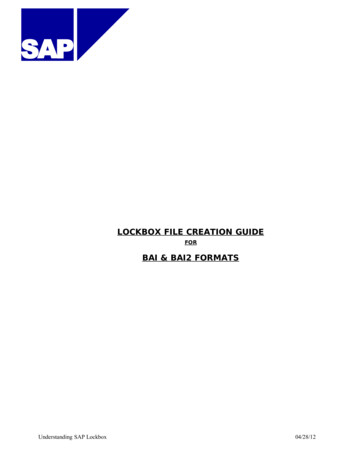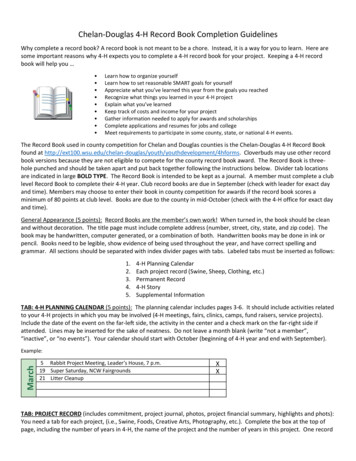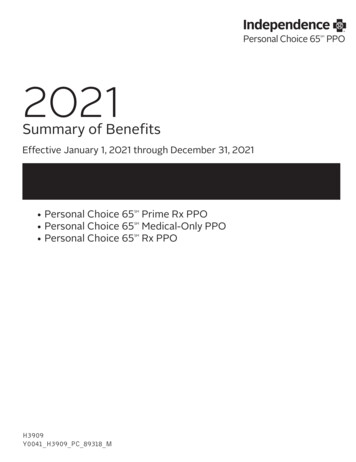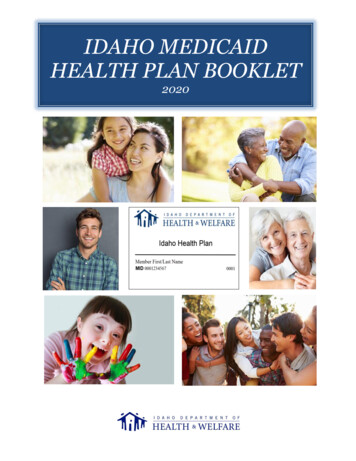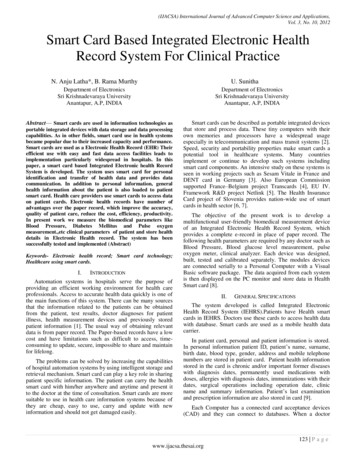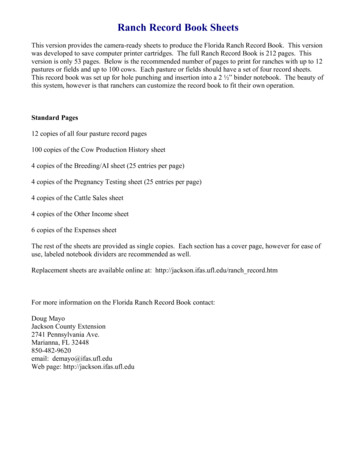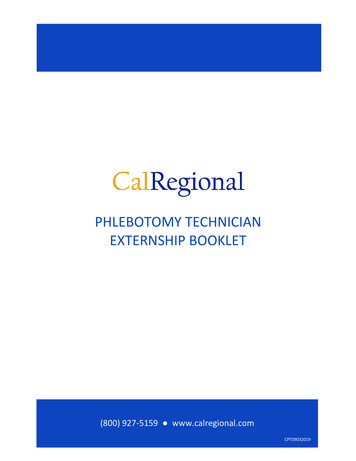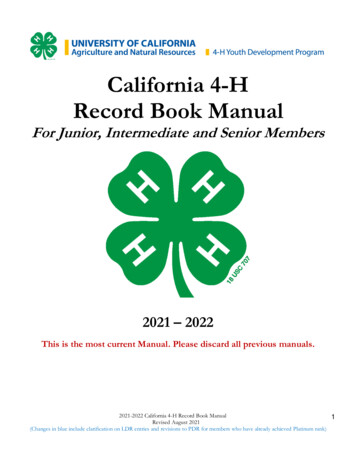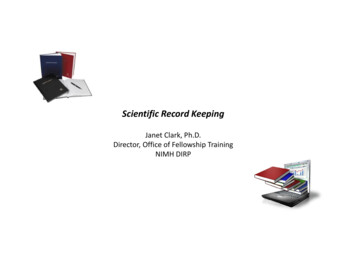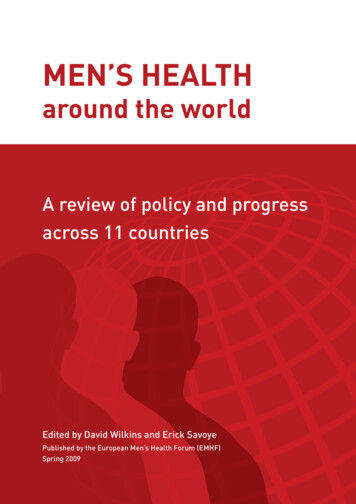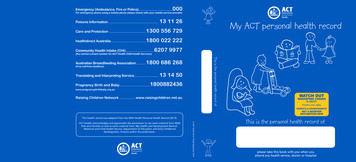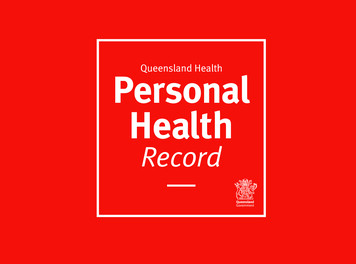
Transcription
This is the Personal Health Record ofPersonal detailsChild’s surnameGiven name(s)Home addressChange of addressDate of birthAboriginal//nYesnNonM nF nITime of birth Birth weightTorres Strait IslanderMain language spoken at home Interpreter needed?nnYesYesnnNoNoMedicare number Number of siblingsParent/Caregiver 1 Personal phoneWork phone EmailParent/Caregiver 2 Personal phoneWork phone EmailChild Health Service Identification NumberPlace UR sticker here1
Emergency contactsAmbulance, Police or Fire, call 000General practitioner:Hospital:Poisons Information Centre (24 hours): 13 11 26Other :General contactsChild health nurseDentistPaediatricianOther13 HEALTH (24 hour health hotline including child health) 13 43 25 84 *and ask for the Child Health NurseAlcohol and Drug Information Service(07) 3837 59891800 177 833www.adis.health.qld.gov.auAustralian Immunisation Register1800 653 ian Breastfeeding Association Helpline1800 686 268www.breastfeeding.asn.au1300 224 636healthyfamilies.beyondblue.org.au1800 177 135www.cyjma.qld.gov.au/child-family1800 811 811www.dvconnect.orgBreastfeeding information and blue: Healthy FamiliesChild Safety After Hours Service Centre(07) 3235 9999Children's Health Queenslandwww.childrens.health.qld.gov.auDomestic Violence Information LineDisability Information and Support13 QGOV (13 74 68) www.qld.gov.au/disabilityEllen Barron Family Centre(07) 3139 amily-centreKidsafe(07) 3854 1829www.kidsafeqld.com.auLactation Consultants of Australia and New Zealandwww.lcanz.orgLifeline (24 hours, cost of a local call)PANDA (Perinatal Anxiety & Depression Aust)13 11 14www.lifeline.org.au1300 301 300www.parentline.com.au13 78 48www.quithq.initiatives.qld.gov.au1300 726 306Parentline (Parenting information and support)www.panda.org.auRaising Children Networkwww.raisingchildren.net.auSmoking Cessation SupportTrue: relationships and reproductive health(07) 3250 0200Women’s Health Queensland(07) 3216 03762www.true.org.au1800 017 676www.womenshealth.org.au* If you are having difficulty connecting it may be useful to dial 13HEALTH using only the first six digits of the phone number(13 43 25). If you are still unable to connect to 13HEALTH then please contact your service provider to discuss the issue.
Significant health events/problemsThis section is for your child's serious illnesses or conditions and should be completed by your doctor, nurse or other healthcare provider.Parents may also like to record their child's other serious health problems here (e.g. allergies).DateAgeProblemManagement and/orhealth service attended3
ForewordThis Personal Health Record meets the Queensland Health Guidelines for Using Screening and Surveillancein the Early Detection of Childhood Conditions, which was developed in response to the NHMRC report Child HealthScreening and Surveillance: A Critical Review of the Evidence. (2002)As standard ages for health checks are not recommended in these guidelines, the ages indicated for health checksin this booklet are given as a guide only.Please keep in mind this booklet is designed as a general record to be used for children born on or around their duedate. If your child has special needs, or you have concerns about your child’s development, please discuss them withyour health professional.AcknowledgmentsQueensland Health is grateful for the financial contribution of Golden Casket to the production of this booklet.We also wish to thank all the parents, health professionals and professional and consumer organisations who assistedwith the development of this Personal Health Record.4
A My Health Record for your babyThe My Health Record is a secure, online summary of a patient’s important health information and is an initiative of theAustralian Government. The My Health Record enables patients and families to control the information they share and whathealth care providers can see. For health care providers, the My Health Record enables access to information about patientssuch as shared health summaries, discharge summaries, prescription and dispense records, pathology reports and diagnosticimaging reports.Registering your baby for a My Health RecordIn your Newborn Pack, you will find a Newborn Child Declaration form, which includes registering your child for Medicare. Onceregistered, your newborn child will get a My Health Record unless you say you do not want one created. A parent can thenaccess their child’s My Health Record via their own myGov account.For more information, visit os/create-record-for-your-newborn. This pagealso includes a link to the My Health Record newborn fact sheet.Childhood DevelopmentIn the Childhood Development section of your child’s My Health Record, you can find: Achievement Diary – record your child’s developmental milestones, e.g. your child’s first words or first steps (healthcare providers cannot view these) Australian Immunisation Register – A list of immunisations your child has received (this information is received fromthe Australian Immunisation Register) Growth Charts – track your child’s growth, including their height, weight and head circumference Information for Parents – additional resources that can be helpful for your child’s development.For more informationFor further information and/or assistance regarding your child’s My Health Record, please visit www.myhealthrecord.gov.au orcontact the My Health Record Help Line on 1800 723 471.5
Aboriginal and Torres Strait Islander ChildrenAboriginalAboriginal andand TorresTorres StraitStrait IslanderIslander ChildrenChildrenQueensland Health is committed to closing the health gap between Aboriginal and Torres Strait Islander and non-Aboriginal andQueenslandHealthcommittedTorresStrait IslanderQueenslandHealth isisAustralians.committed toto closingclosing thethe healthhealth gapgap betweenbetween IndigenousIndigenous andand non-Indigenousnon-Indigenous sthefrontredcoverbookmarkIfononthefrontredcoveror orbookmark/ //If youryour babybaby isis tions.writingandextraimmunisations.writing shield.shield. axEelpmaxE WhileWhile youryour sbirthnotpasslifehearingcan forforlifeasashearingcanchange.baby maymay havehave nota shearingatIt’simportantto have yourchild’searsregularlyraise anyyouraboutbaby’syourhearingat thehealthchange.It’s importantimportantto havehaveyourchild’sears checkedregularlyandcheckedandconcernsraise anyanyaboutconcernsaboutyourbaby’shearingat thethehealthcentre.centre.health centre. AboriginalAboriginal highestrecordedratesmiddleeardisease.Middle ofofmiddleeardisease.Middleearearand dleeardisease, tif �simportantthat theirtheir thatears areare tothethehealthhealthcentre.centre. AboriginalAboriginal seasethanthegeneralpopulation.prevent population.ToTopreventidentifiedand sthis withinpopulation,additional immunisationsand yearly healthchecks are required.identifiedwithindiseaseswithinthis population,population,additional immunisationsimmunisationsare ed by the QueenslandHealthDeadly EarsProgram. furtheryour localAboriginaland/orTorres Strait Islander Health Worker.This resourcewas developedcontactby the QueenslandHealthDeadly EarsProgram.This resource was developed by the Queensland Health Deadly Ears Program.66
Using this book
Registry of Births, Deaths and MarriagesDepartment of Justice and Attorney-GeneralRegister your child’s birthIt is compulsory to register the birth of your child with the Registry of Births, Deaths and Marriages.How to register:Online: www.qld.gov.au/births Parents will be asked to verify 2 forms of ID, e.g. Driver licence or Medicare card. You can order and pay for a certificate at the same time.Download: Visit www.publications.qld.gov.au Search “Birth registration” and download the form. Print, complete, sign and lodge the registration form in person or by post.If you don’t have access to a computer and require a birth registration form, contact us or visit your nearestQueensland Magistrates Court or Queensland Government Agent Program office.Births, Deaths and MarriagesTel: 13 74 68International: 61 7 30223328 00014811Web: www.qld.gov.au/rbdmEmail: bdm-mail@justice.qld.gov.auOffice hours: Monday-Friday, 8:30am-4:30pmForms can be lodged:In person: Level 32, 180 Ann Street, Brisbane Your local Queensland Magistrates Court (exceptBrisbane Magistrates Court) Queensland Government Agent Programs OfficeBy post: PO Box 15188, CITY EAST QLD 4002
Using the Personal Health RecordCongratulations on the birth of your baby.This is an important book for you to keep. It allows you to record details of your child’s health, growth, development andvaccination history. You may use this vaccination history for child care or school records.Be sure to present this record when you take your child to: immunisation sessions your doctor or paediatrician child health nurses — contact 13HEALTH for your local Community Child Health service drop in centres/clinics the dentist other health care provider hospital mental health service enrol in child care, kindergarten or school.To get the most value out of this record, present it to health care providers and ask them to record results and vaccinations inrelevant sections.Parents should also make records in this book – look for the for pages you should fill in. Prior to child health checkscomplete the relevant ‘Questions for parents’ page, or the PEDS questionnaire. This way you will be able to participate in yourchild’s health assessment.Child Health Information – your guide to the first 12 months.Inserted in the cover of this Personal Health Record is a booklet, Child Health Information – your guide to the first 12months. This booklet contains useful information including development, breastfeeding, introducing solids, safe sleeping,injury prevention and oral health. Refer to this booklet often to learn what to expect and to answer some questions youmight have. You might also like to discuss the topics further with your health professional at your baby’s health checks.PDFs of the Personal Health Record and the Child Health Information booklet are available -record7
help withwith readingreadingEnglish?English?Do you need helpmeaning ofof nexplainit.it.If the meaningvaluable –– This book is valuablespoken inin thethe home:home:Languages spokenInterpreterService:Service:Telephone Interpreter131450Interpreters && TranslatorsTranslatorsAgency:Agency:ONCALL Interpreters699907 3115 6999Interpreter Service:Service:Other Interpreter8
9
General practitioner roleYour local general practitioner (GP or family doctor) plays a very important role in your family’s health care. They are usuallythe first health professional to see if you have any concerns about your child’s health. GPs provide continuing, comprehensivecare for children and families, within the communities in which they live. Their services include: immunisation monitoring your child’s health and development treatment of accidents, minor injuries and illnesses working closely with child health nurses, and specialists if needed, to help manage your child’s careChild health nurse roleChild health nurses are registered nurses with postgraduate qualifications and experience in child and family healthnursing. Child health nurses may also hold additional qualifications in midwifery or paediatrics or be International BoardCertified Lactation Consultants (IBCLC). They are able to support families with key health promotion interventions forchildren and families as well as evidence-based prevention, health education and anticipatory guidance, which include: 10immunisationbreastfeedinginfant and young child feeding and nutritionphysical activity, normal infant developmentand playhealthy weight and growthinjury prevention and safetySIDS prevention and safe sleepingsun safetyinfant sleep oral healthear and hearing healthspeech and languageparent-infant relationshipinfant behaviour and responding to infant cuesrelationship based parenting education and skilldevelopmentfamily health promotionrecovery from birthadjustment to parenting.
Parents' Evaluation of Developmental Status (PEDS)As a parent you know your child better than anyone else does. You may notice things about your child that concern you –perhaps even things that no one else has noticed. It is important that you share these with your health care provider. Researchshows us that sharing your concerns about your child can help your health care provider understand your child better, and mayalso help pick up any problems early. PEDS is a set of 10 tested and reliable questions that are included at the following healthchecks: 6 months(page 31) 12 months(page 35) 18 months(page 39) 2½ –3½ years (page 43) 4–5 years(page 47).Please answer these questions before each designated health check and discuss them with the health care provider duringthat health check to help them better understand your child.11
Promoting your child’s healthScreening tests are used to monitor your child’s health and development and to identify problems early. It is importantto complete the ‘Questions for parents’, including the PEDS questions, before each health check. If you circle any shadedanswers, it is important to discuss these issues with your health care provider.Tests which will be performedNNST The Neonatal Screening Test involves taking a few drops of blood from your baby’s heel to detect as earlyas possible some rare but serious conditions that require treatment to reduce harmful effects to your baby.If this test is not done in the hospital, it should be done by your GP before the baby is 10 days old.Hearing Hearing screening is now offered to all newborn babies in Queensland. It is important to identify a hearing lossas soon after birth as possible so that your child is given the best chance for developing normal speech andlanguage. If this screen is not done in hospital you should arrange an outpatient appointment to have it doneas soon as possible.VisionYour health professional will check for any problems, including turned eyes and poor vision.The following schedule of eye tests is recommended:Assessment0-6mths6 mths12 mths18 mths2 years3 years4-5 yearsOcular historyExternal inspection of lidsand eyesRed reflex testingPupil examinationFixate and follow responseOcular alignment andmotility assessmentVisual acuity12
GrowthMeasuring your child’s height, weight and head circumference assists in assessing your child’s growth.Development Observations help to identify problems of speech, language, movement and social skills.Hips Developmental dysplasia of the hips (previously called congenital dislocation of the hips) is a conditionwhich can lead to problems with standing and walking and to painful degeneration of the hips with time.Examination and assessment of your baby’s hips may enable early detection of problems.Heart Your doctor will check your baby for heart problems, including congenital heart disease. This is doneat birth, again within the first week and at six weeks. If you go home from hospital early, please ensureyou have your baby checked by your doctor within the first week and at six weeks. This examinationshould be repeated between two and a half and three and a half years of age.TestesBoys are assessed to check the testes have descended well down into the scrotum.13
MilestonesNoting when your child reaches certain milestones is a great way to remember and record your child’s development.MilestoneDateAgeMilestoneSmiles at parentsTries to pull self upFollows objects with eyesStands holding onRaises head when lying on tummyClaps handsTurns eyes toward interesting soundsWalks with one hand heldChuckles, squeals, gurgles or laughsUnderstands simple commandsStarts to make speech-like soundsSays ‘Ma-ma’ or ‘Da-da’ appropriatelyHolds head up when sitting on your kneeFirst word (other than ‘Ma-ma’ or ‘Da-da’)Rolls over from tummy to backWalks aloneRolls over from back to tummyHolds cup and drinks by selfPuts things into mouthFeeds self with spoonPlays with toesPuts two words togetherSits up without supportRunsReaches out to be picked upSpeaks in short sentencesRecognises own nameIs usually dry during the dayPasses things from one hand to the otherCan draw a straight line and circleIs shy with strangersDresses selfFirst toothIs usually dry through the nightWaves goodbyeManages buttonsUses thumb and finger to pick things upTies shoe laces14DateAge
Neonatal examination
Have you looked at the Raising Children Network website?www.raisingchildren.net.au
Newborn health examination – birth details (use writing shield when filling out this page)To be completed by a doctor or midwife in the presence of the parents.Place of birthURDoctor/midwifeDate of birth//nTime of birthBirth weightnMFPregnancy informationLabour complications/medication that may affect the growth and development of the childMother’s blood group Anti D given?LabournSpontaneousnnnYesNoInduced Reason for inductionLabour complications Type of deliveryPostpartum complicationsNeonatal informationGestationApgar: 1 minute5 minutesBaby’s blood group (if tested)Birth lengthHead circAbnormalities at birthProblems requiring treatmentVitamin K injectionOR Vitamin K oralnnYesDose 1n/ /No/ /Hepatitis B Immunoglobulin (if required)n Yes nnNoIf no, give reason/ /Dose 2nn/ /Dose 3TB advice to Chest Clinic (if required)15
Neonatal notesThis page is for health professionals to record further notes from the neonatal examinations, if required.Date16AgeNotes
Neonatal examination – prior to dischargeChild’s nameMedical Record Number//DateAge WeightNNST*Head circ FeedingSignaturenDonenNot doneBirthmarksAdditional information/Risk factors/concernsAntenatally diagnosed fetal abnormalityFamily history (including deafness)Feeding concernsMother’s medication/supplementsBaby’s medication/supplementsSCN* or ICN* (duration and diagnosis)Other issuesExamination normal,nnnnn abnormal (explain in comments),nnnnnspinegenitaliaanusmeconium passedurine passed not examined.respiratorycardiac (auscultation and seyes and red reflexesCommentsHepatitis B vaccinationHealthy Hearing screeningnnYesCompletednnNo//DateNot completed//Date(record on page 72)(see page 21)* NNST Neonatal Screening Test. Health Professionals please note: if this is not filled in, please phone (07) 3646 7051 to determine whether the test has been undertaken.* SCN Special Care Nursery * ICN Intensive Care Nursery17
Neonatal examination – prior to dischargeChild’s nameMedical Record Number//DateAge WeightNNST*Head circ FeedingSignaturenDonenNot doneBirthmarksAdditional information/Risk factors/concernsAntenatally diagnosed fetal abnormalityFamily history (including deafness)Feeding concernsMother’s medication/supplementsBaby’s medication/supplementsSCN* or ICN* (duration and diagnosis)Other issuesExamination normal,nnnnn abnormal (explain in comments),nnnnnspinegenitaliaanusmeconium passedurine passed not examined.respiratorycardiac (auscultation and seyes and red reflexesCommentsHepatitis B vaccinationHealthy Hearing screeningnnYesCompletednnNo//DateNot completed//Date(record on page 72)(see page 21)* NNST Neonatal Screening Test. Health Professionals please note: if this is not filled in, please phone (07) 3646 7051 to determine whether the test has been undertaken.* SCN Special Care Nursery * ICN Intensive Care Nursery18
Treatment requiredJaundiceAntibioticPhototherapyProven InfectionnnnnYesYesYesYesnnnnChild’s nameMedical Record NumberNoNoNoNoOtherInvestigationsHealth promotion topics discussed with parents or care giverFFFFFFUsing this Personal Health Record including PEDSUsing the Child Health Information bookletFeedingSafe infant sleeping informationInjury prevention & reducing home hazardsImportance of regular growth checksFFFFFFVaccinationsParent/carer pertussis vaccination (record on page 75)Tobacco, e-cigarettes (incl passive smoking)/alcohol/drug useRoles of GP/child health nurse/community midwife/health workerAdjustment to parenthood / parents' mental health & wellbeingEar & hearing health and need for regular ear & hearing checks(Aboriginal and Torres Strait Islander)Recommendations, follow-ups, discharge medicationnRepeat neonatal examination by GP by day 7 after birth (discharged within 72 hours)Signature of doctor or midwife Name19
Treatment requiredJaundiceAntibioticPhototherapyProven InfectionnnnnYesYesYesYesnnnnChild’s nameMedical Record NumberNoNoNoNoOtherInvestigationsHealth promotion topics discussed with parents or care giverFFFFFFUsing this Personal Health Record including PEDSUsing the Child Health Information bookletFeedingSafe infant sleeping informationInjury prevention & reducing home hazardsImportance of regular growth checksFFFFFFVaccinationsParent/carer pertussis vaccination (record on page 75)Tobacco, e-cigarettes (incl passive smoking)/alcohol/drug useRoles of GP/child health nurse/community midwife/health workerAdjustment to parenthood / parents' mental health & wellbeingEar & hearing health and need for regular ear & hearing checks(Aboriginal and Torres Strait Islander)Recommendations, follow-ups, discharge medicationnRepeat neonatal examination by GP by day 7 after birth (discharged within 72 hours)Signature of doctor or midwife Name20
Healthy HearingIf hearing screen was not undertaken, indicate reason:Hearing screen resultsScreen 1 Date / / / /Screen 2 Date/nPass nReferLeft earnPass nRefer2nd screen required. nYes nNoRight earRight earLeft ear//(If result reversed in screens 1&2)/Screen 3 DatenPass nRefernPass nRefer//nPass nReferLeft earnPass nReferAction: Audiology testing referralnYes nNoFamily Support referralnYes nNoRight earSignatureSignature//Follow-up audiology retesting required before child’s first birthday?(Paediatrician or GP may request earlier audiology test)SignaturenYes nNoAtList risk factorsnFor Aboriginal and Torres Strait Islander children, discussed ear infections and importance of hearing for developmentAudiology testing ons following audiology testingnnENT recommendedDischargedFurther audiology review:nYesnnnNoHearing AustraliaGP/paediatrician advised of resultsnnEarly intervention adviceOtherDate/clinic:ENT findings21
Neonatal examination by day 7If baby is discharged from hospital within 72 hours of birth this examination should be conducted by a GP.n Done now n Done previously//DateAge WeightNNST* (see page 17)Head Circ FeedingSignatureHearing screen (see page 21):nFurther assessment indicated nNo further assessment indicated nScreen not doneFamily history (including deafness)Mother’s medication/supplementsBaby’s medication/supplementsFeeding concernsBirth marksExaminationnnnnn normal, abnormal (explain in comments),jaundicefontanelle/sutureseyes / red reflexes / white mbsnnnnn not examined.spinegenitaliaanusmeconium within 24 hoursabdomen and umbilicusnnnnnrespiratorycardiac (auscultation)cardiac (femoral tions, follow ups, medicationHealth promotion issues discussed with parents or care givernnRoles of GP/child health nurse/community midwife/health workerSafety, e.g. injury prevention, safe sleeping, smoke-free environmentDoctor’s signature22nnVaccinations funded/non-fundedHearing / ear healthnFeedingName* NNST Neonatal Screening Test
Health checks
Questions for parentsPromptly after your baby’s birth, answer the following.Circle your answersHearing profileHas your baby had a hearing screen (see P21)?YesNoUnsureIf yes, was your baby referred for a further hearing test by an audiologist?YesNoUnsureDid any of baby’s parents, brothers or sisters have permanent hearing loss before they were three years old?YesNoUnsureDid any of baby’s parents, brothers or sisters have middle ear infections, and/or associated hearing loss?YesNoUnsureDid your baby have severe problems with breathing (asphyxia) or convulsions when he/she was born?YesNoUnsureDid you have any infections, such as rubella, toxoplasmosis, CMV, herpes or syphilis during pregnancy?YesNoUnsureHas your baby had meningitis?YesNoUnsureWas your baby ventilated for more than five days?YesNoUnsureDoes your baby have a cleft palate or other problem of his/her face or head?YesNoUnsureHas your baby been diagnosed with a syndrome, e.g. Down Syndrome?YesNoUnsureWas your baby treated for severe jaundice while in hospital?YesNoUnsureHave any of your baby’s close relatives had a turned eye or lazy eye?YesNoUnsureDid anyone in your family have problems with vision when they were children?YesNoUnsureWas your baby born before 37 weeks?YesNoUnsureDid you have any infections during pregnancy?YesNoUnsureDid baby’s mother have a diabetic condition during pregnancy? (If yes – discuss regular screening for mother)YesNoUnsureDo you have any questions about your baby’s immunisation?YesNoUnsureDo you feel you and your partner are coping with the adjustment to parenthood?YesNoUnsureVision profileOtherIf you circled any of the shaded answers, it is important to discuss these with your health professional.23
Questions for parentsCircle your answersBefore your child’s first health checkDid you answer any shaded questions on the previous page?YesNoUnsureDo you have any concerns about your baby?YesNoUnsureIs your baby startled by loud noises such as a loud clap?YesNoUnsureHave you had any problems feeding your baby?YesNoUnsureIf you have circled any of the shaded answers, it is important to discuss these with your health professional.What feeding method are you using?Suggested topics for discussionGeneral Using this record Using the Child Health Information booklet Services offered by your GP/child health nurse The importance of the PEDS questionnaire Immunisation Talking, reading, singing and playing with your baby Safe infant sleeping information Parent-child relationships (bonding/attachment) Passive smoking Injury prevention (e.g. car capsules) Tummy time & reducing home hazards Ear infections and hearing loss Sun protection Vision and eye health Feeding and growth Strategies for supine settling No screen time e.g. TV Sleeping, comfortingYour babyParents' health 24Support groupsContraceptionMother's breast care, breastfeeding,(attachment positioning, comfort, supply,expressing) How you are coping with your babyNutrition and restTobacco, alcohol, drug useGeneral health (including mother's EPDS*)Family relationships*EPDS Edinburgh Postnatal Depression Scale
Child’s ageTo be completed by doctor or child health nurse.Within Normal LimitsHealth AssessmentYesWeightgmLengthcmHead circumferencecmNoReviewReferCommentsHead symmetryMouth/palate/frenulumVision/eye examination (refer to P.12)Newborn hearing screen completed*R L R L CardiovascularFemoral pulsesHipsGenitaliaDevelopmentOther* When an at risk family presents it is critical that all tests occur during this appointmentCommentsNamenMedical PractitionernSignatureRemember your baby’s vaccinations can be given from 6 weeks.Registered Nurse/ /Date250-4 weeksHealth assessmentApprox 0–4 weeks
Questions for parentsCircle your answersBefore your chi
Queensland Health is committed to closing the health gap between Indigenous and non-Indigenous Australians. e If your baby is Aboriginal and/or Torres Strait Islander, please put the enclosed stickers on the front red cover or book mark / writing shield. They inform health care provid
